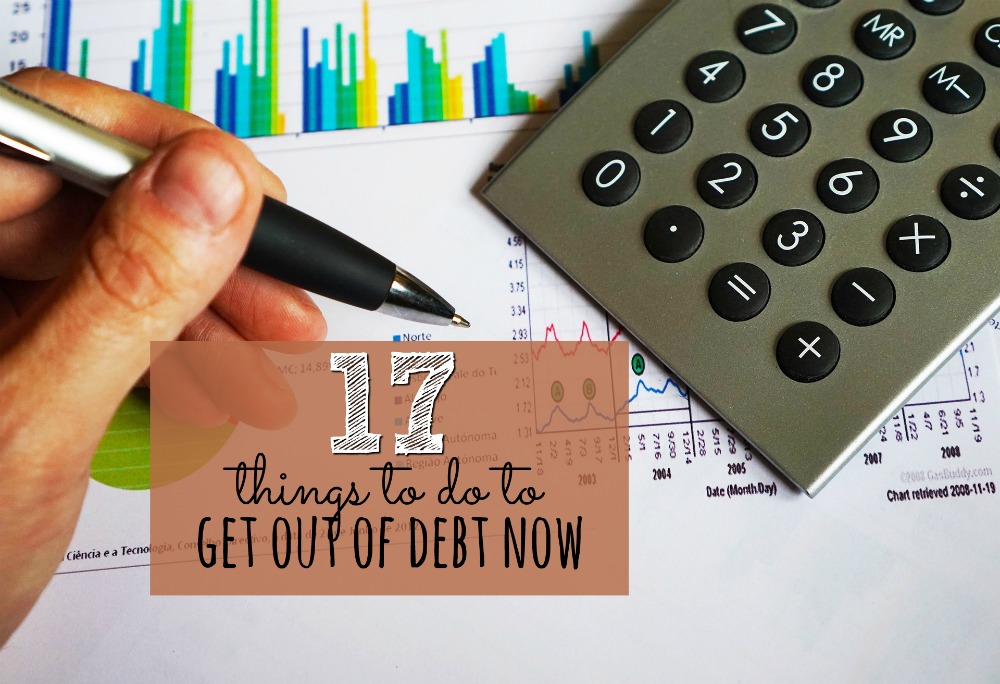 If you’re feeling overwhelmed by debt you’re not alone. The average American household has more than $90,000 worth of combined debt.
If you’re feeling overwhelmed by debt you’re not alone. The average American household has more than $90,000 worth of combined debt.
The average credit card debt is over $16,000, the average auto loan over $27,000, and the average student loan over $48,000! Considering the average household income is only $52,000 per year these numbers are nothing to sneeze at.
The good news is that no matter how much debt you’ve accumulated at this point you can turn it all around starting now.
Here are 17 thing to do to get out of debt.
The Basics
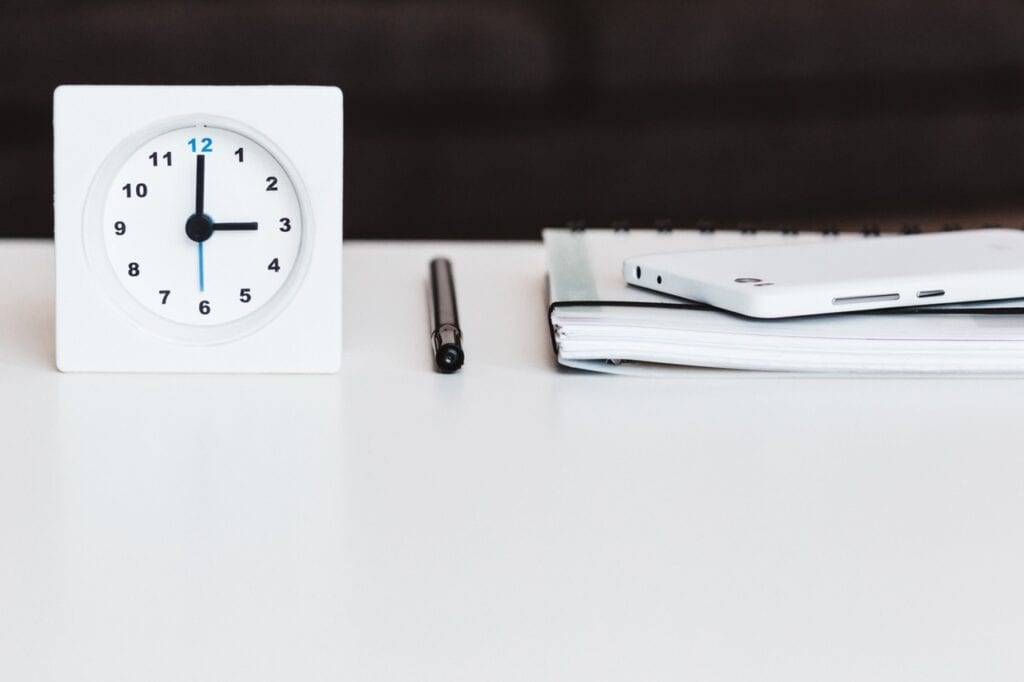
Before you begin paying down your balances you’ll first need to do a little prep work.
Here are the things you need to do before the debt pay off begins.
# 1. Tally it All Up
It will be impossible for you to pay off your debt if you don’t know where you’re starting. While I completely understand that there may be some initial hesitation to tally everything, it needs to be done!
Now is the time to be honest with yourself. Pull out all of your credit card statements, student loan bills, personal loans, furniture loans, car loans, etc. Add them all up!
# 2. Create a Budget
Creating a budget will allow you to see how much extra money you have to throw at your debt. If it ends up being not too much, don’t worry – this is just your starting point. We’ll find plenty of ways for you to slash your expenses and earn more to put toward your debt.
If you need help creating a budget here are free budgeting printables and here’s how to create a responsible budget.
# 3. Determine Your Plan of Attack
 When it comes to paying down debt there are two common ways to go about it: the debt snowball and the debt avalanche.
When it comes to paying down debt there are two common ways to go about it: the debt snowball and the debt avalanche.
The debt snowball, made popular by Dave Ramsey, will have you list your debts in order from smallest balance to largest balance. You’ll then working on eliminating your smallest balance while still making minimum payments on everything else. When the smallest balance is gone you’ll move to the next smallest.
The debt snowball is my favorite method as I prefer the mental wins of paying a debt off and the ease of having less balances to work with.
With the debt avalanche you’ll list all of your debts in order from highest interest rate to lowest interest rate. You’ll then work on eliminating your highest interest rate debt while making minimum payments on everything else. This method will save you the most money over the long run.
Neither method is right nor wrong. What you choose will come down to personal preference. You can check out this post from Debt Roundup if you want to learn more about each method.
# 4. Make Sure Your Emergency Fund is in Order
Before you get to the actual debt payoff you need to make sure you have at least $1,000 in an emergency fund.
Having money set aside strictly for emergencies will keep you from relying on credit cards or other forms of debt in case something important comes up. And let’s be real, we all know emergencies come up that require money more often than we’d like.
Save up at least $1,000 while still making minimum payments on all of your debt.
New to emergency funds? Here’s what you need to know.
# 5. Cut Up Your Credit Cards
Credit cards (aside from payday loans) are some of the worst forms of debt you can have. Their interest rates are astronomical and you can spend years trying to pay down the balance.
If credit cards have gotten you into debt you need to cut them up now! Your credit card should not act as your emergency fund.
# 6. Treat Your Debt Like It’s an Emergency
Do you know what debt holds you back from? A lot of things.
Having debt can keep you from building savings, becoming financially stable, and of course it will keep you from reaching financial independence.
Let’s say for example that you have a sick family member. You can’ take off work because you have no savings and a ton of debt.
You’re invited to a last minute getaway with your best friends. You’ve just maxed out your last credit card, have a ton of debt, and no savings.
Your job makes you absolutely miserable. You can’t quit though – you have no savings and a ton of debt.
You get the picture. Whether you’ve admitted it or not having a high debt load negatively impacts your quality of life. The good news is that you can turn it all around starting today.
Treat your debt like an emergency and get rid of it forever!
Save More Money
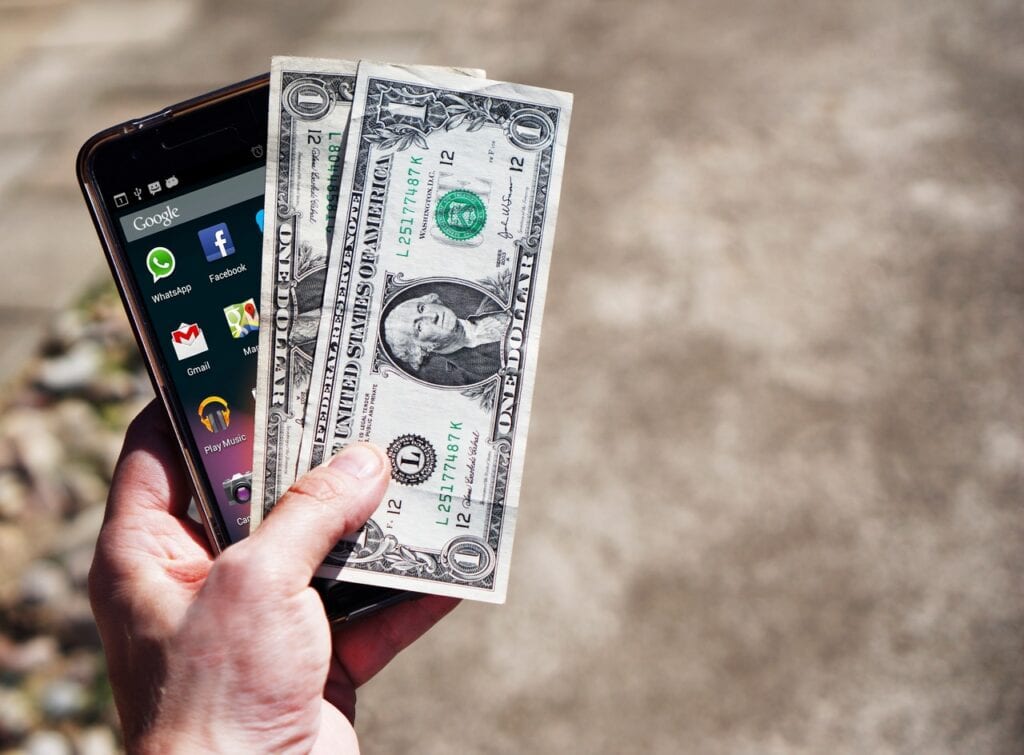
Now that the basics are out of the way it’s time to free up some room in your budget. Here are smart ways to save money.
# 7 – Reassess Your Living Situation
Your living situation and how much you pay for it can make or break your budget. Since rent and mortgage payments are your biggest expense they’re the first thing you should look to lower.
Here are some ideas:
- Move to a cheaper place (Here’s what I did.)
- Get a roommate
- Refinance your mortgage to a lower interest rate (don’t increase the term and make sure closing costs don’t negate your savings)
- Sell your house and rent or buy cheaper
Changing your living situation isn’t always fun but if you can’t afford where you live, then you can’t afford where you live.
# 8. Cut the Cable
The year I went without any type of Satellite/Cable TV was one of the most productive years I had. I was working two day jobs and spent my “extra” time building up my side hustles instead of watching TV. (Those side hustles helped me build my emergency fund and quit my day jobs!)
The other advantage to no TV was no bill.
If you don’t want to eliminate your TV watching altogether here are 10 much cheaper alternatives to regular cable/satellite.
# 9 – Lower Your Phone Bill
Another big and unnecessary expense is often the phone bill. If you’re on a contract plan there’s a good chance you’re paying too much.
Today’s no-contract phones are just as good as anything else and cost a fraction of the price. My favorite no-contract companies (I’ve used both of these) are Republic Wireless and Net10. You can get phone plans starting as low as $10/month.
# 10 – Stop Eating Out
Food spending is often problematic but it’s also one of the easiest areas for you to control. If you’ve looked through your past spending and found that a lot of money is going towards food you need to make some changes.
The first thing you should do is stop eating out. It’s much cheaper and more efficient to make your own food at home. You can also check out these 15 ways to save on groceries for more ideas.
# 11 – Shop Secondhand
 While you’re paying off your debt you’ll want to keep purchases down to a minimum. When you do have to make a purchase shop secondhand.
While you’re paying off your debt you’ll want to keep purchases down to a minimum. When you do have to make a purchase shop secondhand.
Try to find the things you need at yard sales, on Craigslist and from family members or friends. If you’re in need of clothes I recommend ThredUp. (<- Get a $10 credit with that link.)
# 12 – Get a Grasp on Your Utility Bills
An often overlooked way to save is by lowering utility bills. I know, working to lower utility bills doesn’t seem fun at all. Luckily, it doesn’t take much work!
Here’s how to lower your utility bills without reducing your usage.
# 13 – Sell Your Expensive Car
Car payments are the worst. I discovered this when I bought an $18k car on a $20k/year salary. Horrible mistake. That was nine years ago and I’ve had the car ever since. (Fully paid off now and will be driven until it falls apart!)
If your car payment is busting your budget it’s time to downgrade.
Need some inspiration? Read how Jessi dropped $18k in debt in one day by getting rid of her car.
Pay Your Debt Off Faster
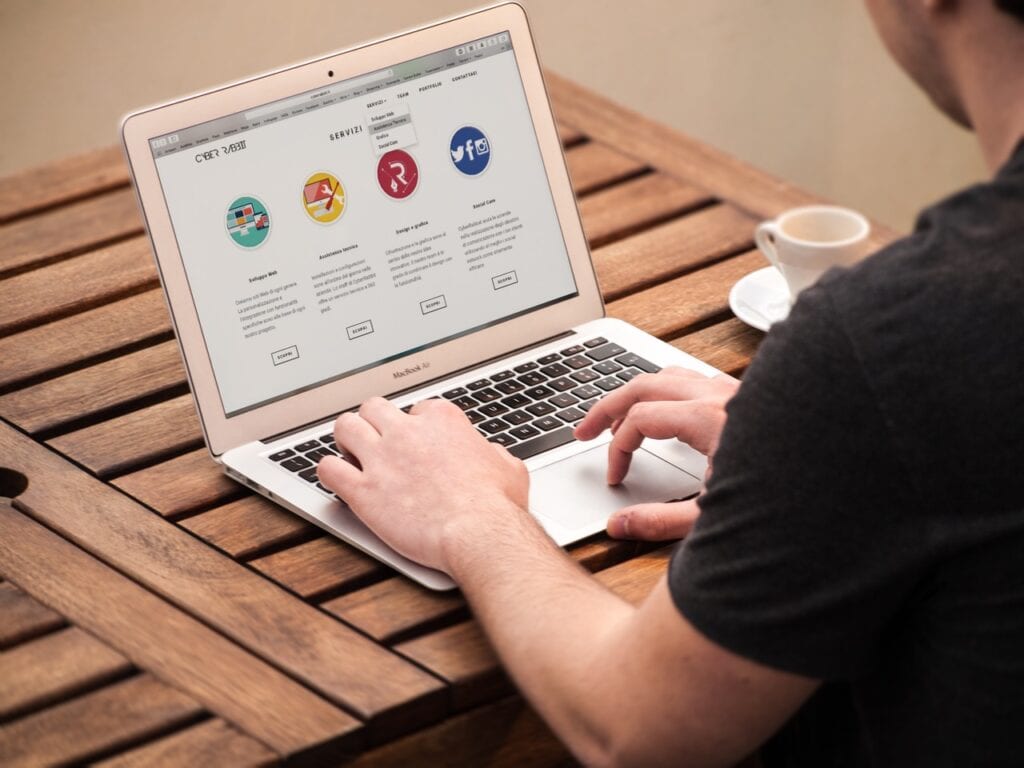
One of the best ways to pay off your debt faster it to earn more money. Luckily for you there are hundreds of ways to go about this. Here are some of the most effective.
# 14 – Use Your Tax Refund
By now you may or may not have any money left from your tax refund. If you do you can use that money to fulfill your emergency fund and begin paying down your debt. If you don’t have any of that money leftover then make a plan for next year’s tax refund.
A large tax refund it can do wonders for paying down your debt.
# 15 – Work More Hours
Do you have a job that offers a lot of overtime? If so, take it!
If you’re serious about treating your debt as an emergency you need to be serious about earning enough money to pay back your debt. Working more hours at your current job is one smart way to do so.
# 16 – Get a Second Job
If you’re in a position where you can’t pick up more hours at your current job then a second, part time job might be needed. This is what I did when I tried to get back on my feet. While I couldn’t keep up two jobs for a long period of time having both sources of income for several months allowed me to build up my savings.
There are tons of second job ideas out there.
# 17 – Start a Side Hustle
My most profitable ventures have been the ones I started on the side and slowly grew. For example, last year this blog earned me more than triple what my previous day jobs earned me. I’ve also done well with freelance writing and virtual assisting.
There are so many ways you can earn money on the side. For ideas check out these 50 ways to earn at least an extra $100 per month.
Stay Consistent to Pay Off Your Debt
You didn’t get into debt in one day and you won’t get out in one day. However if you follow these tips, stay consistent, and remain honest with yourself you can start making progress on your debt pay-off now.
Just remember, if you slip up it’s not the end of the world. Jump back in where you left off. Little by little your hard work will add up and you’ll become debt free.
What was the biggest thing you did to pay off your debt?
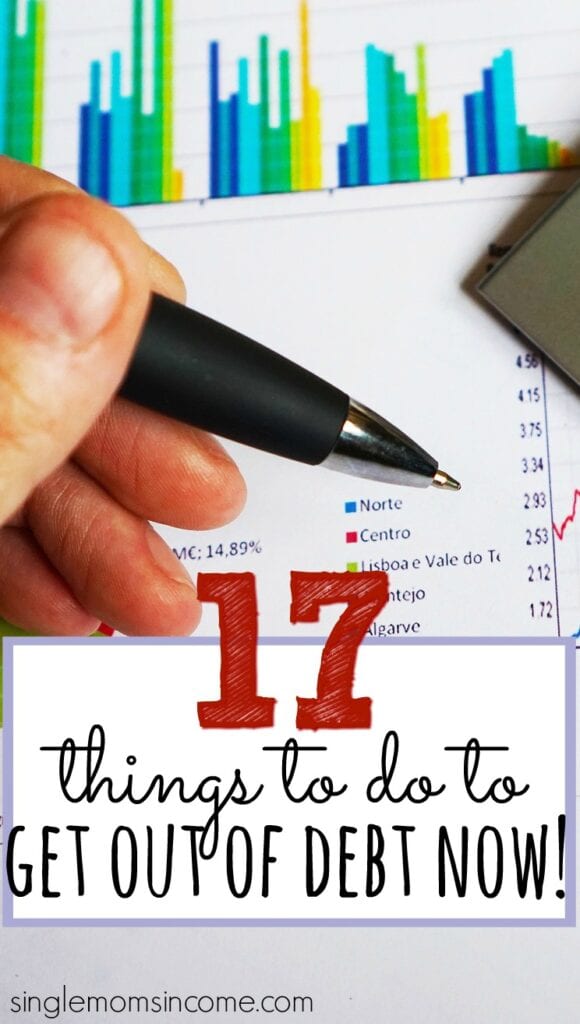
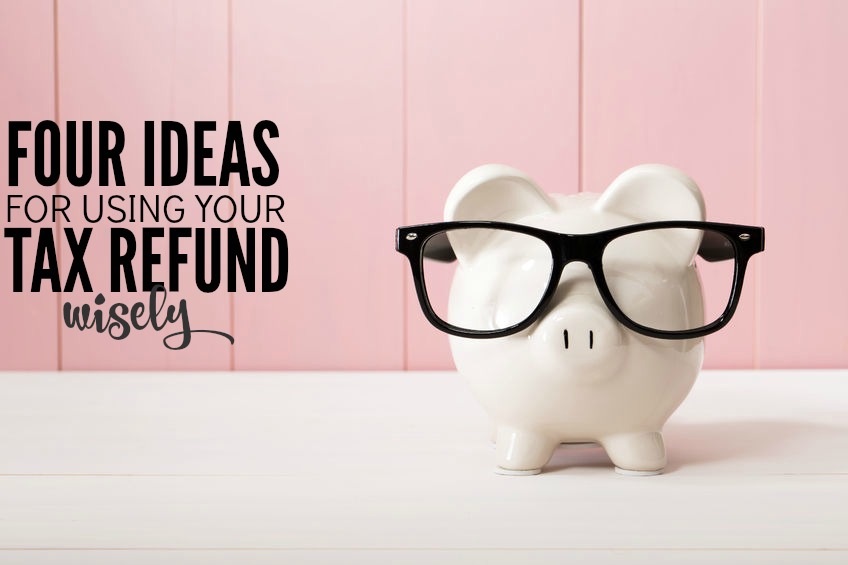
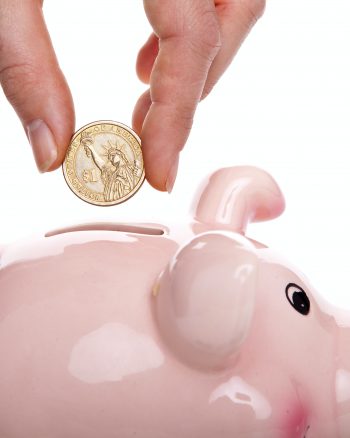

When we paid off our debts, the first thing we did was to treat it as an emergency! In the beginning, we were ‘relaxed’ about it, we even skipped a month or two every now and then… but then realized debt was only dragging us down.
So, paying debt first (along with the other important expenses, such as rent!) has helped a great deal!
The day we made the last payment I did a happy dance 😀 Thank goodness no one saw me though!